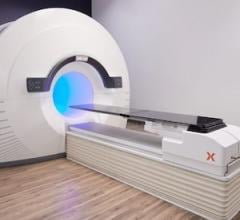
December 18, 2008 — AngioDynamics Inc. announced the use of its irreversible electroporation (IRE) technology on a lymph node metastasis and the first lung lesion case at The Alfred in Melbourne, Australia.
Using the NanoKnife system, Ken Thomson, M.D., professor and director of the department of radiology at The Alfred, Monash University, performed the procedures, which were judged by The Alfred to be successful from a safety perspective. The hospital will conduct further patient follow-up before determining final outcomes in terms of tumor response.
Dr. Thomson reported that the two patients who were treated did not report pain related to the procedures. These are the fifth and sixth cases using NanoKnife at The Alfred, with three liver cases and a kidney case preceding them, all with procedural success.
“I have been an interventional radiologist since 1974 and this is the most exciting development in minimal access therapy I have seen,” said Dr. Thomson. “For the patient, the absence of post-operative pain is unique and remarkable. We have also treated tumors in the liver and kidney with NanoKnife, with similar experiences – no postoperative pain at all – and the procedures have raised no safety concerns. This is probably due to the fact that the supporting structure of the tissue treated is not destroyed and vascular and nerve function is unaffected.”
Regarding a previously announced liver case from The Alfred, sequential triple-phase liver CT scans and ultrasound at two weeks and four weeks post-procedure have shown that a 2 cm tumor has disappeared on imaging. At the site of a 3.5 cm tumor near the diaphragm in the same patient there is only a minor non-enhancing scar. Dr Thomson noted these outcomes contrast very favorably with the cavities left following thermal ablation procedures.
NanoKnife causes cell death by impacting the cell membranes of targeted tissue with pulses of electricity, effectively sparing nearby nerves, blood vessels, lymphatic system, and other delicate structures. Targeted cells are removed from the body through blood vessels and lymphatic systems.
This is different from thermal ablation modalities like cryo-ablation, microwave, and radiofrequency ablation. These other modalities destroy all cells including critical structures in targeted tissue, leaving destroyed material in place for years. The body can only remove it slowly and tediously by attacking from the outside, as all normal pathways to remove damaged tissue have been destroyed, said the company.
AngioDynamics intends to file investigational device exemptions (IDE) with the FDA to pursue additional and more specific tissue indications. The device has been cleared for a general soft tissue ablation indication by the FDA.
For more information: www.angiodynamics.com


 January 13, 2026
January 13, 2026 








